- Home
- Regan Walker
Racing with the Wind (Agents of the Crown) Page 2
Racing with the Wind (Agents of the Crown) Read online
Page 2
Hugh’s mind seized at the memory of another riding accident, one that had forever changed his life. But that was not what Griffen referenced. “She couldn’t have been very old at the time.”
“No, she was quite young. An only child. I understand it was heart-rending. Now some young cousin or other will inherit the title.”
Hugh’s eyes followed the girl as she moved gracefully away from and back to her partner. She was laughing at something her partner was saying, her head thrown back in unusual abandon. It was a sensual display, and to his surprise his body responded; his trousers were suddenly too tight.
“All the ton has been anticipating her,” Griffen offered. “This is her first season.”
Hugh was puzzled. “Anticipating her? Why is that?”
“Surely you have heard, my friend. The fiercely independent—and some say rebellious—Mary Campbell? While our young fops here will dote on the girl, I expect the young men’s fathers hope she does not choose them. She has a reputation.”
“What kind of a reputation?”
“Well, a diamond of the first water she may be, but still a diamond in the rough. Too intelligent for a young woman, and both headstrong and outspoken with a tongue that cuts like a blade.”
“A bluestocking hellion?”
“Just so. Of course, it all can be explained, her having been raised without a father. The dowager countess, her mother, is a gentle woman, and she was clearly not up to the challenge. Lady Mary will be…difficult to manage.”
“Hmm.”
“Have you really never met her, not even when you were younger?”
“No.” Even as Hugh said the word, he wondered why that was. The Campbell estate lay only a short ride from his family’s country home. Then again, he’d been on the Continent for several years. “Have you?”
Griffen chuckled. “Oh, aye, and it was most disconcerting. A rare bit of baggage, that one.”
Hugh turned to his friend, suddenly curious. “Don’t be obscure. Tell me.”
“Well, she stared at me with such a bold look I’ll not soon forget… There’s no fear in those piercing green eyes, I can assure you. It’s a bit off-putting in a female that young. Nor is she shy with her opinions.”
Hugh’s gaze returned to the young woman. He sensed again that she was different, but perhaps it was simply as Griffen suggested and she would be difficult to manage. While he loved a challenge, he did not need a difficult and marriageable young woman. Not now. Not ever.
As he and Griffen turned toward the card room, Hugh silently pitied the man who ended up with her.
Chapter 2
Mary stared out the large mullioned windows of the study in Campbell Manor, a beautiful stone mansion set against groves of trees and well manicured sloping lawns and gardens in Ruislip, twelve miles outside of London. It was her home and she loved it, especially on such a rare spring day. The morning sun pierced the leaves of the trees, leaving a dappled pattern of light on the grass beneath. Through the window she heard a bird loudly chirping.
A shuffling noise caused her to turn. Her uncle Adrian, Lord Baynes, sat in one of the tapestry wing chairs flanking the stone fireplace, a pile of papers in his lap. The scene made her smile. With thick silver hair and blue eyes, he was a man of great presence, wisdom and quiet authority. Respected by kings, he’d become a diplomat preferred by the Crown for its most difficult tasks.
Mary’s heart filled with gratitude. It was at his table in London where she’d first been introduced to the world beyond England, where she’d learned of war and its effects, of leaders whose pride and ambition had rent the countries of Europe. In the last few years, she had persuaded him to take her along on a few of his trips to the Continent. They had traveled to Vienna and Paris, and her life had become exciting. She had every intention of going with him on his next venture, if only she could be certain he would take her.
“Those must be interesting papers you’re studying so intently, Uncle.”
He didn’t look up. “It’s that lingering business in Paris. I would not bring work to a visit with you and your mother, but I need to study the issues I will soon be facing. It’s a chessboard, and the pieces seem to be moving all at once.”
“Sounds fascinating,” Mary said.
He peered up at her, concern lining his face. “Too fascinating, I fear.”
She did not want him to dwell on his worries; he might change his mind and leave her behind. So she reached for a different subject. “The crocuses have come up, Uncle, and the first roses will soon be in bloom.”
“Yes, your mother is a wonder with flowers,” her uncle murmured, returning his attention to his papers.
Mary smiled, gazing at several purple blooms just outside the window. Her mother did love gardens, and those around Campbell Manor were well tended. Mary loved them, too, but her father’s passion—and hers—had always been books. They spilled off the shelves lining the study and the library. With them, she could travel the world without ever leaving home, and she had done so many times.
Though unusual for a young woman, Mary read nearly every day. Now she reached for the book she had been reading the evening before, the philosophical writings of a Frenchman who encouraged men to “Think well.”
“I thought you were reading Waverley, that novel by Walter Scott, the author the Prince Regent so admires,” her uncle said, amusement in his voice. “I see you are back to Pascal.”
“Cannot I read both at once?”
“I suppose you can, but why ever would you want to?”
“Variety, Uncle.” She sighed. “I like books that make me think, but I also like romantic tales. Waverley has opened my eyes to what happened to the Scots in the uprising in 1745. I know the Campbells sided with the Crown, but I cannot help but sympathize with the Highlanders. They only wanted their independence. It’s a melancholy story.”
“You’re just like your father. Unafraid to question the actions of the British government. I always respected him for it, though it got him into trouble more than once. I fear it will be so for you.”
“But you have told me more than once that Father was a loyal subject of the Crown. And so am I. And the Prince Regent loves the book! Why, he even asked the author to dine with him.”
“Hmm,” her uncle murmured without looking up, and then asked, “Are you keeping up your French?”
One of Mary’s tutors had seen to her initial learning of the language. Philippe Dumont had taught one of the aristocratic families of France before the Revolution and his escape to England. As an only child living in the country outside of London, Mary had had a lot of time on her hands. She had been so enthusiastic about all things French, she’d even spent every dreary afternoon for a full stormy winter learning to make delicacies with her mother’s new French pastry chef.
“Mais, oui!” she enthused. “And my German to a lesser extent. I want to be ready for our next trip.”
“If I can arrange for you to see more of Paris this time, you will need to speak French very well indeed.” Her uncle raised his head from his papers. “I forgot to ask you, Mary. How was your first ball?”
“Are you certain you want to know?” It still wearied her to think on what had begun her season.
“Of course I want to know! Did you enjoy yourself?”
“So many trivial conversations, so many formal greetings, so many awkward introductions. It was not at all like the dinners I attended with you on the Continent. Were it not for Lizzy, I think I should have left early.” Then she recalled the tall man with the piercing dark eyes who had drawn her gaze all evening. She had not been able to stop thinking of him since.
Her uncle shook his head. “A young woman needs to be able to converse about more than politics, my dear. More than wars and governments. Proper young ladies concern themselves with other things. Surely the dancing was pleasant?”
“Oh, I do love to dance, so yes, I enjoyed that part. But I have no illusion that the ton welcomed me.”
She shook off thoughts of the ball and returned to her contemplation of the morning. The sun struck the desk in front of the window, and sitting in its warmth, she was cheered. It was a lovely day to ride Midnight; the long green carpet of grass framed by boxwood hedges beckoned from outside.
Mary walked across the room to where her uncle sat, leaned down and kissed him on the cheek. “I thought I’d ride Midnight for awhile. Do you mind if I am gone for an hour?”
“No, not at all,” her uncle said. “But do return for luncheon—dressed in ladies’ apparel.”
She just smiled at him, winking a yes as she left the room.
A few minutes later, she was dressed in her riding clothes and headed for the stables, her maid Milly shaking her head in despair. Long ago Mary had decided not to ride a horse as other women did; the only way to ride was fast and hard, and only a man’s clothes and a man’s way of riding would allow her the freedom for which she longed. With her mother’s grudging approval, she had riding clothes designed: a cut-down man’s white shirt, close-fitting tan riding breeches, a black velvet vest and black Hessian boots. She especially loved her boots and the feel of the smooth black leather clinging to her calves.
Today was warm enough she wouldn’t need a jacket, and Mary’s long legs rapidly covered the ground leading to the stables. Her heels hit the stone walk with a determined click. That sound, the stable boy had told her, always signaled her approach. She tossed her head, causing her long hair to fall in loose waves down her back.
The ton would have found her outfit shocking, but only her family, the servants and a few friends had ever seen it. There were rumors about her riding, of course. But even if others had seen her, Mary didn’t care. She’d pay any price for the freedom and exhilaration of riding Midnight. She had fallen in love with the great black stallion, a gift to her uncle from a foreign dignitary, and it seemed the stallion reciprocated. No one else could master him—just as no one would ever master her.
* * *
Sitting in his wing chair, Mary’s uncle pondered the work ahead. He half wished he could talk Mary into spending the entire season in London, but that was a losing battle, for she had no love of the social whirl of the haut ton. They had compromised with her agreeing to attend several balls and social events, which would have to be enough. Perhaps she would find a man she could care for, a man who would love her strength. If not, he was prepared to arrange a good match.
Then again… Adrian’s thoughts returned to Paris, and to the great help she had been on his last trip. Her beauty had disarmed the French dignitaries and their allies; her quips had been well placed in the few conversations she’d been allowed to join, and her strong opinions, coming from such a young woman, had amused the leaders. But what he valued most were her judgments regarding the men he met with. And her ability to do things he himself could not.
On his last trip to Paris, due to an unusual turn of events, he’d kept her with him when the preliminary business began. Discussions eventually commenced in earnest, and while the men turned their attention to pressing issues Mary faded into the background, moving to the other side of the large meeting room with a book. The others were turned away when Adrian next glanced up and saw his niece sitting next to the minister’s desk.
He’d watched surreptitiously as Mary lifted a paper. She had clearly seen something she thought was important, for she carefully reviewed the note before putting it back. And she had been right about its importance he had been pleased to later discover, for she recalled the note that she had memorized word-for-word. Oh yes, he wanted to take her with him on his next trip. When he was back in London, he would speak to the Prince Regent about including her.
His visit had brought him other matters to attend, however. Here in Ruislip, he was close to the Duke of Albany’s country estate, so he had sent a note to the duke’s son and been delighted to learn Lord Ormond could see him. Adrian had liked the young man when they’d first met, following a session in the House of Lords when Ormond had come to see his father, the duke. Adrian’s new mission was to strengthen the ties between England and the restored Bourbon monarchy, and the Prince Regent himself had suggested Ormond might prove useful. The continuing turmoil in France and the occupying allied armies were making the resolution of issues more difficult.
Thinking again about his past days in Vienna, Adrian almost laughed. The Congress of Vienna! The word congress amused him greatly, given the group’s methods. The European diplomats convened to decide upon issues arising from France’s Revolution and the war with Napoleon, but they never met in session. Most of their discussions took place in informal meetings, often ending in heated debates. It seemed to Adrian that men forever argued over land and boundaries. He doubted they would ever stop.
* * *
It was nearly eleven in the morning when Hugh arrived at his destination astride his chestnut Thoroughbred. The man with whom he was to meet, now reclining on the terrace with his newspaper, rose to greet him.
“Welcome to Campbell Manor, Lord Ormond.”
“I’m grateful for the invitation, Lord Baynes. You picked an amazing day for it. It isn’t often I am asked to attend a meeting with a diplomat on a sunny day in the country.”
“I was thinking we might enjoy our conversation even more if we were to discuss our business while taking a stroll around the grounds. Would that be acceptable?”
Hugh nodded. “It would please me a great deal. I need to stretch my legs.”
The two proceeded to enjoy a lively discussion as they walked the path winding down toward the river. Hugh was more than relieved to hear the statesman shared his belief that France’s leader, Louis XVIII, needed to show clear reform if he was to hold the esteem of his people. He hastened to tell the older man, “You’ll find Louis warm to your desire to bond the two countries just now. In fact he may be delighted, Lord Baynes. He prefers the English to the other allies swarming—”
Hugh stopped mid sentence, his attention drawn to the black stallion that thundered across the wide green lawn. The horse’s muscles rippled along its huge flanks, and its long mane and tail trailed out behind like great black flags as it galloped in front of him. The scene reminded him of another day, another black stallion. That stallion had lost its rider.
It was not often he allowed himself to think of it, to think about Henry. Just like always, the guilt and pain below the surface of Hugh’s cool composure welled up inside him. In his mind he saw again the crumpled body of his younger brother. A cold sweat broke out across his face.
“Is something wrong?” his companion asked.
“No…no. Just a passing memory.”
Shrugging off the vision, Hugh studied the great black horse racing toward a copse of trees, concentrating now upon its rider. Each moment brought more amazement. A girl sat astride the stallion, dressed in men’s riding clothes, her long legs clinging to the beast’s flanks and her golden hair streaming out behind her, a pennon of liquid sunlight. She was like a goddess riding upon a mythical beast.
He held his breath as she raised her arms and tilted her face up to the sky. It was the most alluring sight he’d ever seen, like a bird flying. He stood mesmerized.
“Who is she?”
Lord Baynes smiled. “Ah. That would be our Mary.”
Mary Campbell…the ingénue I watched at the ball?
“Have you not met her?” Lord Baynes inquired.
“I have not had the pleasure.” Hugh’s eyes continued to follow the girl in wonder as she dropped her hands, took hold of her reins and leaned forward to stroke the stallion’s neck while the beast slowed to a trot as she neared the trees. “Does she always ride like that—in men’s breeches, astride, so fast and so…reckless?”
A look of amusement crossed the statesman’s face. “She does, though not many have observed it. And she would take exception to your description of her as reckless. She is not your typical young lady.”
“So I’ve heard.” Griffen’s description of
Mary Campbell returned to Hugh. And this was the second time in only a few weeks that another man was surprised they had not met.
“Would it surprise you to know I once forbade her to ride that way?” Lord Baynes asked.
“No,” Hugh said, reminded again of what Griffen had said. “It wouldn’t surprise me at all.”
“It was a few years ago,” Lord Baynes continued. “Of course it did no good. She persisted, as is her wont, and thus you see her here.”
Hugh couldn’t miss a pleased note in the older man’s voice. He was proud of the girl. “She is stubborn?”
“Oh, no,” Lord Baynes corrected. “I wouldn’t call her stubborn. More…determined. When she sets her mind to something, there is little that can stop her. She can indeed be persuaded against taking a path, but the argument had best be sound. In this case, she believed propriety less important than the accomplishment of mastering a horse no one else could. Now she races with the wind.”
“It still seems foolish to me to be riding like that.” Hugh watched as the girl and stallion disappeared behind the grove of trees. Turning to the diplomat he said, “Perhaps you might introduce me?”
His voice remained calm, imparting nothing of his desperate interest. Duke’s son or no, Lord Baynes was likely also aware of his reputation as a rake. Still, they’d be working together and at some point he’d likely encounter the girl, so perhaps the older man would relent.
Lord Baynes’s face was a mask of reserve, but then it softened as if he had made a decision. “I’m joining the ladies for their luncheon today, so if you stay I’ll be happy to do that.”
Hugh smiled. “If that’s an invitation, Lord Baynes, it would be my pleasure to accept.”
* * *
Mary loved the power of the horse beneath her, the blur of the landscape as she gained speed and the wind on her face as she rode. There was a fierce wildness inside her, a restless energy that craved action. Midnight was a worthy companion, for the horse shared her wild nature.

 Summer Warrior (The Clan Donald Saga Book 1)
Summer Warrior (The Clan Donald Saga Book 1) Echo in the Wind
Echo in the Wind Once Upon a Christmas Past
Once Upon a Christmas Past A Secret Scottish Christmas (Agents of the Crown Book 4)
A Secret Scottish Christmas (Agents of the Crown Book 4)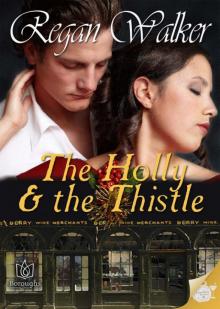 The Holly and the Thistle
The Holly and the Thistle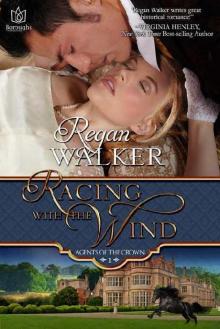 Racing with the Wind (Agents of the Crown)
Racing with the Wind (Agents of the Crown) Wind Raven (Agents of the Crown)
Wind Raven (Agents of the Crown) Rebel Warrior (Medieval Warriors #3)
Rebel Warrior (Medieval Warriors #3)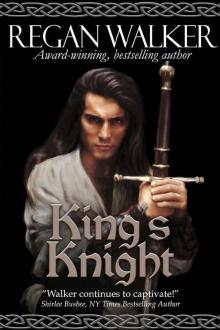 King's Knight (Medieval Warriors Book 4)
King's Knight (Medieval Warriors Book 4)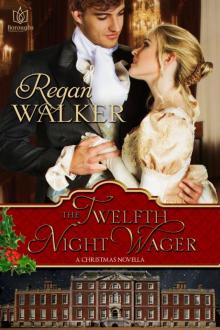 The Twelfth Night Wager
The Twelfth Night Wager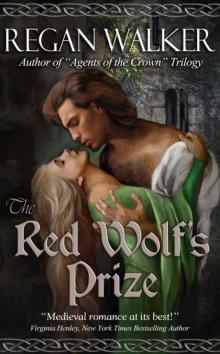 The Red Wolf's Prize
The Red Wolf's Prize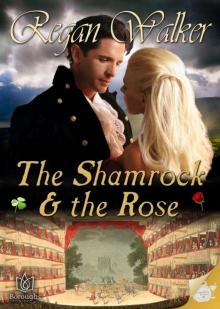 The Shamrock & the Rose
The Shamrock & the Rose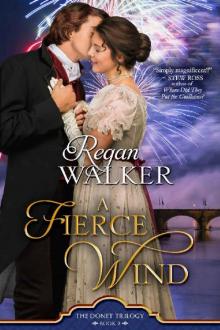 A Fierce Wind (Donet Trilogy Book 3)
A Fierce Wind (Donet Trilogy Book 3)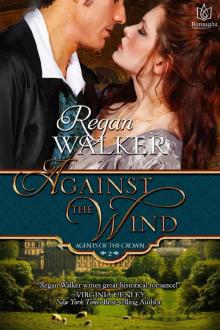 Against the Wind (Agents of the Crown Book 2)
Against the Wind (Agents of the Crown Book 2)